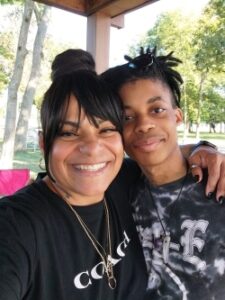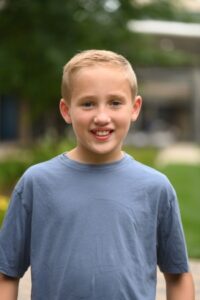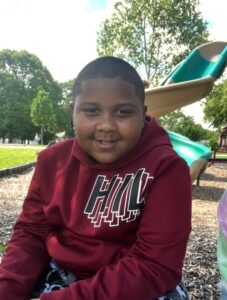Carah Brown
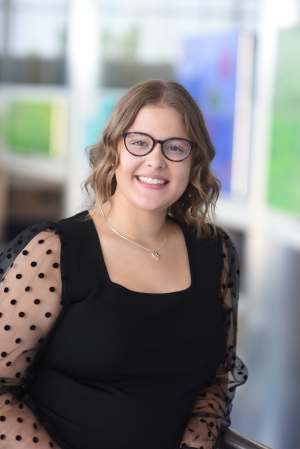
Carah embraces her stutter
- patient name: Carah Brown
- patient age: 17
- condition: stuttering
- seen in: speech / language pathology
At just 16 years old, Carah Brown already has a future direction in mind – empower others and be a voice of change for those like her. At the age of three, Carah was diagnosed with childhood-onset fluency disorder (also known as stuttering). While most children outgrow a stutter by age of 5, Carah did not.
According to the National Stuttering Association, 79 million people worldwide has a stutter. Researchers believe that stuttering is caused by a combination of factors, including genetics, language development, environment, as well as brain structure and function. For Carah her stutter is genetically related as her mom and sisters had stutters. However, unlike Carah, they outgrew it when they were young.
While Carah was made fun of by some classmates, for most of her elementary and middle school years, she never felt very different, had a strong group of friends and was supported by others. That all changed during 6th grade, when a substitute teacher mocked her in class, leaving Carah spiraling with her self-esteem and confidence in herself and others plummeting. She mentally and emotionally struggled and didn’t want to go to school. For her mom, Susan, there was a profound sense of hopelessness watching her daughter struggle.
“I would tell her that she was perfectly wonderfully made. She wasn’t broken and didn’t need “fixed” but nothing I said made an impact,” Susan said.

finding the right care
Carah saw countless speech therapists over the years but never felt there was a right fit as the focus was placed on her speech fluency with no thought to the deep, lingering emotional trauma she was experiencing. Susan searched for someone who specialized in teens and had an understanding of stuttering. “We prayed for someone who could specifically treat Carah for her condition and the effects of it,” Susan said.
Their prayers were answered when Carah was in 7th grade and came to Dayton Children’s speech therapy program and to speech therapist Sarah Strother.
In that first appointment, Sarah explained the “iceberg analogy” to Carah where above the water you can work on the physical techniques but underneath the surface there are the mental and emotional hurdles that have a much larger, deeper effect.
“I was struggling. I felt belittled and like a charity case. I was a mess. Everyone was trying to help me, but no one knew how. Sarah was the first person ever to acknowledge the fears I had about my condition and the emotional part that comes with it,” Carah said.
For Susan, to watch the light filter back into her daughter’s eyes because someone finally unlocked that missing piece was something she wasn’t certain she’d ever see again.
“Before Sarah, I felt like I was losing my kid. But from the time we walk through those speech therapy doors, they took the time to actually talk with Carah and dug deeper to the parts that people can’t see. And helped Carah in learning tools and techniques to navigate those feelings and mental roadblocks,” Susan said.
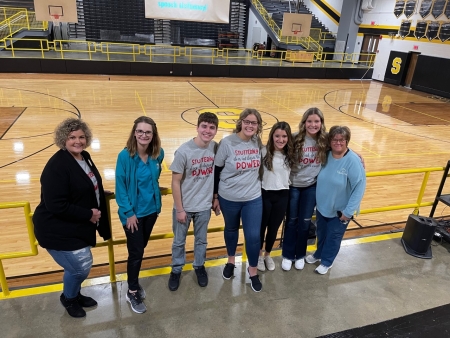
embracing her stutter and empowering others
Carah will always have a stutter; however, she’s learned that her condition does not steal the power of her own voice. She embraces who she is and looks to share her story and spread awareness. One way she’s doing that is by educating her former middle school by giving a keynote speech every year about stuttering, understanding yourself and your feelings, and bullying. What started out as a one-time talk three years ago – at the encouragement of her high school counselor – is now part of the school’s curriculum.
Carah’s also been featured in stories by Dayton area media and the National Stuttering Association (NSA), invited her and the family to its annual conference this summer in Florida. While she’s excited to meet others in the stuttering community, she’s most looking forward to finally meeting in person her friend, Amanda Mammana, America’s Got Talent contestant, a musician and a member of the stuttering community. Amanda took her passion for songwriting and music to national television showing the world that despite a person’s differences, you can achieve your goals and allow your voice to be heard. Over the course of the last several months, Amanda and Carah have formed a friendship over social media and Facetime calls, sharing their own experiences.
“stuttering is a part of me, but it doesn’t define me. I have a lot of goals set for the future and I’m just getting started,” Carah said.
share your story
Every patient journey at Dayton Children’s is powerful — from NICU miracles to courageous cancer survivors and beyond. These patient stories not only celebrate our families but also offer hope and encouragement to others facing similar challenges. Share your experience today and help inspire, support, and celebrate the strength of our patients and families.

care that goes above and beyond
Because every child deserves care that goes above and beyond, Dayton Children’s provides compassionate, expert care for kids of all ages. Find a provider, schedule an appointment, or learn more about conditions we treat today.

